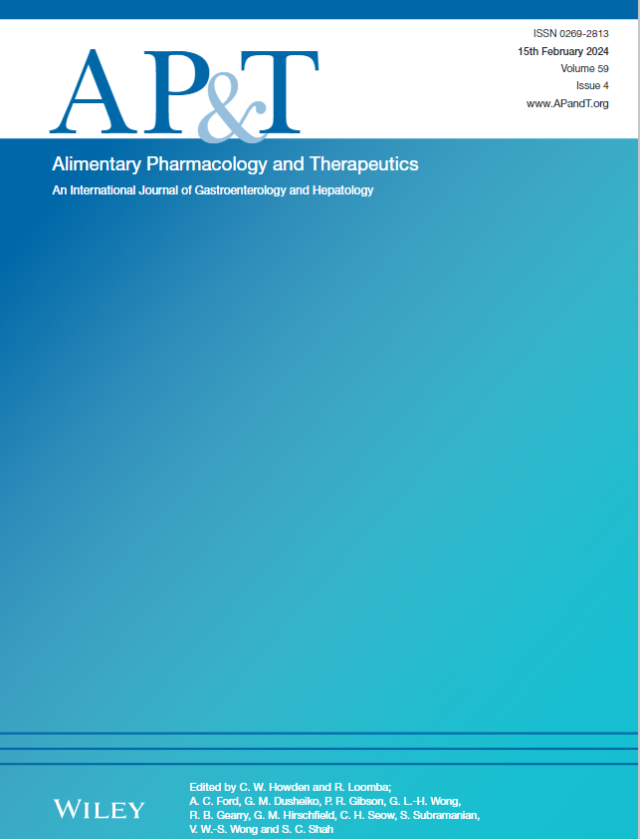综述文章:血液恶性肿瘤药物性肝损伤与抗体治疗相关。
IF 6.6
1区 医学
Q1 GASTROENTEROLOGY & HEPATOLOGY
引用次数: 0
摘要
药物性肝损伤(DILI)是肝损伤的主要原因。它在血液恶性肿瘤中尤其普遍,使治疗方案复杂化,并可能导致急性肝功能衰竭等严重后果。基于抗体的疗法显著改善了治疗效果。然而,这些疗法越来越多地与肝损伤相关,给临床管理带来了挑战。目的:本综述旨在研究血液学恶性肿瘤中与抗体治疗相关的DILI,强调关键机制、危险因素、临床管理策略,并确定需要进一步研究的领域。方法:我们对基于抗体的治疗方法(包括单克隆抗体、抗体-药物偶联物和t细胞重定向抗体)诱导DILI的文献进行了全面回顾,特别是在血液系统恶性肿瘤的背景下。结果dili与基于抗体的治疗相关,从轻度转氨酶升高到严重肝损伤不等。危险因素包括先前存在的肝脏疾病、遗传易感性和治疗特异性机制,如免疫介导的肝损伤或直接肝毒性作用。目前的管理策略包括常规肝功能监测、剂量调整和严重病例停药。然而,标准化的指导方针仍然缺乏。结论sdili仍然是血液病恶性肿瘤抗体治疗的主要挑战。虽然在了解风险因素和管理策略方面取得了进展,但进一步的研究对于优化患者护理和平衡治疗效果与肝毒性风险至关重要。本文章由计算机程序翻译,如有差异,请以英文原文为准。
Review Article: Drug-Induced Liver Injury Associated With Antibody-Based Therapies in Haematologic Malignancies.
BACKGROUND
Drug-induced liver injury (DILI) is a leading cause of liver damage. It is especially prevalent in haematologic malignancies, complicating treatment regimens and posing a risk for severe outcomes such as acute liver failure. Antibody-based therapies have significantly improved treatment outcomes. However, these therapies are increasingly associated with liver injury, posing challenges in clinical management.
AIMS
This review aims to examine the DILI associated with antibody-based therapies in haematologic malignancies, highlighting key mechanisms, risk factors, clinical management strategies, and identifying areas that require further research.
METHODS
We conducted a comprehensive review of the literature on DILI induced by antibody-based therapies, including monoclonal antibodies, antibody-drug conjugates, and T-cell redirecting antibodies, specifically in the context of haematologic malignancies.
RESULTS
DILI associated with antibody-based therapies varies from mild transaminase elevations to severe liver injury. Risk factors include pre-existing liver disease, genetic predisposition, and therapy-specific mechanisms such as immune-mediated liver damage or direct hepatotoxic effects. Current management strategies involve routine liver function monitoring, dose modifications, and therapy discontinuation in severe cases. However, standardised guidelines remain lacking.
CONCLUSIONS
DILI remains a major challenge in the use of antibody-based therapies for haematologic malignancies. While progress has been made in understanding risk factors and management strategies, further research is essential to optimise patient care and balance therapeutic efficacy with liver toxicity risks.
求助全文
通过发布文献求助,成功后即可免费获取论文全文。
去求助
来源期刊
CiteScore
15.60
自引率
7.90%
发文量
527
审稿时长
3-6 weeks
期刊介绍:
Alimentary Pharmacology & Therapeutics is a global pharmacology journal focused on the impact of drugs on the human gastrointestinal and hepato-biliary systems. It covers a diverse range of topics, often with immediate clinical relevance to its readership.

 求助内容:
求助内容: 应助结果提醒方式:
应助结果提醒方式:


